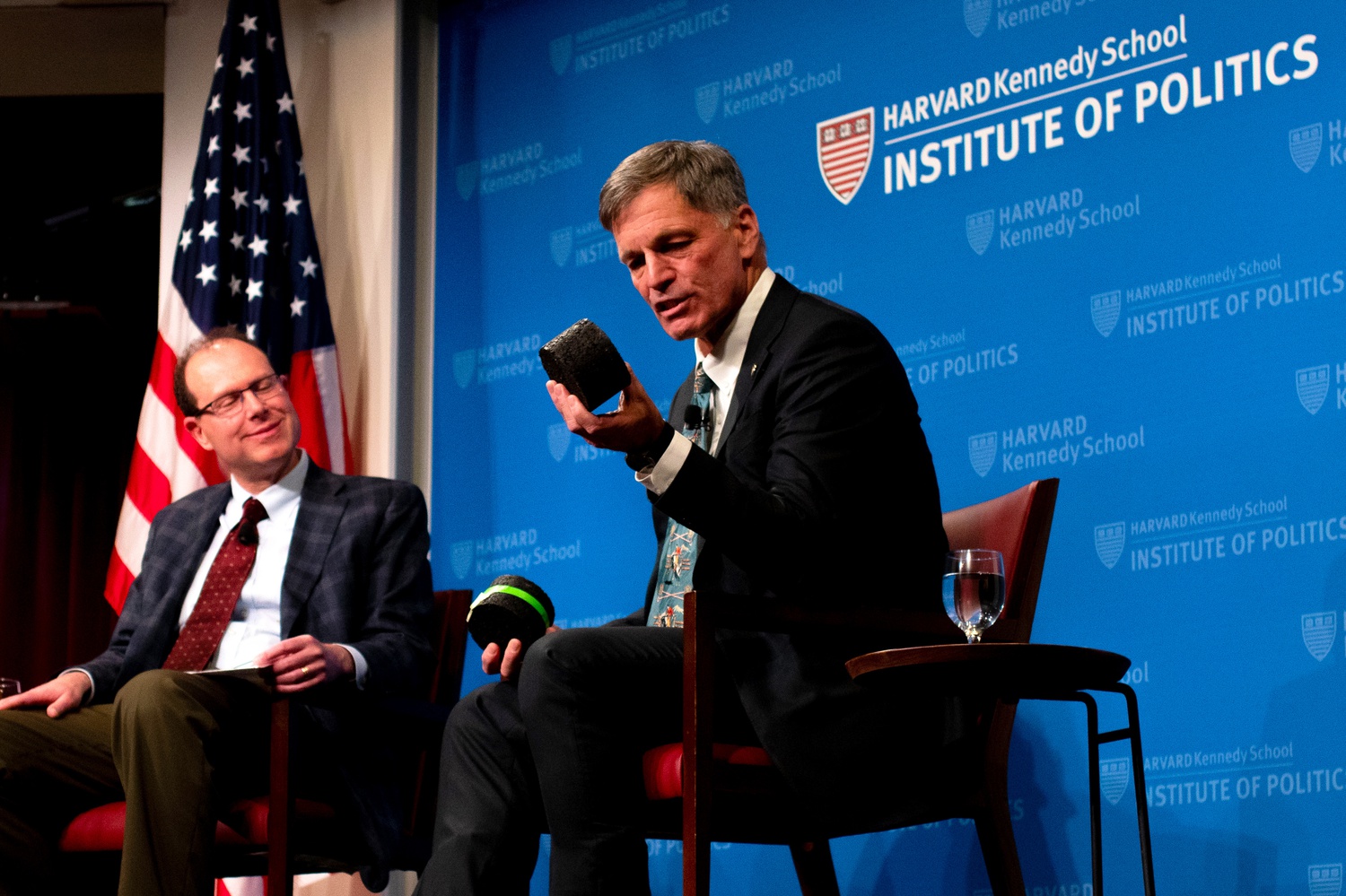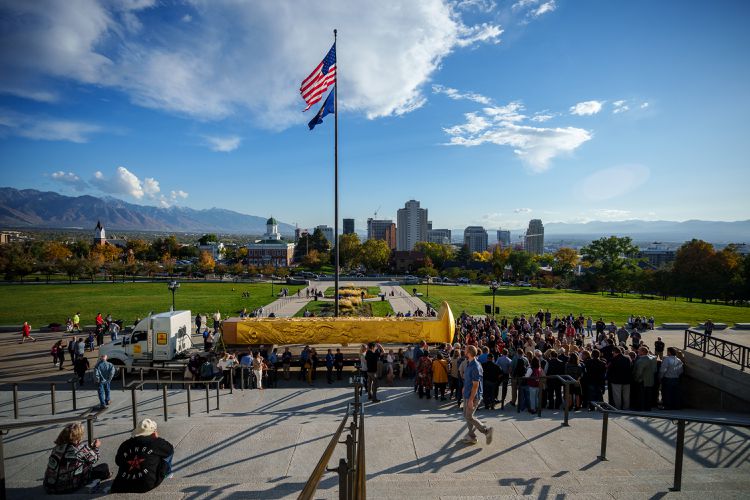10/26/23
Best of the West: Historic grid upgrades; Gov. Gordon’s Harvard speech; Regional Tech Hubs; Water conservation; and Soil health

The Western Governors' Association keeps you updated on the latest news in the West. Here are the top stories for the week starting Oct. 23, 2023. (Photos courtesy of Frank S. Zhou and Trent Nelson).
The big news this past week was that the Department of Energy allocated $3.5 billion for 58 projects in 44 states that aim to deliver more clean energy to the grid and better protect U.S. electricity from extreme weather disruptions.
U.S. Secretary of Energy Jennifer Granholm said it was the single largest investment in the grid in American history with the Federal funding expected to leverage more than $8 billion in investments.
The projects are broken into three categories:
Grid Resilience Utility and Industry Grants will modernize the electric grid to reduce impacts due to extreme weather and natural disasters. The largest grants went to areas that recently experienced catastrophic wildfires.
- PacifiCorp’s Equity-aware Enhancement of grid Resiliency project will invest over $100 million in regional asset hardening and system automation for the electrical grid serving disadvantaged communities in Oregon and California. An additional $50 million will support sophisticated weather forecasting models and artificial intelligence-enabled wildfire detection cameras.
- Xcel Energy was provided $100 million to implement seven projects in its Colorado, New Mexico, and Texas service territory that will provide system-wide wildfire risk mitigation including non-expulsion fuses and undergrounding of select high-risk distribution circuits. It will also fund the use of emerging technology, such as drones aided by artificial intelligence that inspect power lines for safety and satellite identification of trees that pose a fire risk.
- Midwest Energy was also provided a $100 million Grid Resilience Utility and Industry Grant to accelerate substation and transmission line upgrades in Kansas, including rebuilding and/or replacing 150 miles of transmission lines across seven counties.
Smart Grid Grants will increase the flexibility, efficiency, and reliability of the electric power system by increasing the capacity of the transmission system, preventing faults that may lead to wildfires, integrating renewable energy, and facilitating the integration of increasing electrified vehicles, buildings, and other grid-edge devices.
- With a $50 million Smart Grid Grant, Oklahoma Gas and Electric will launch an adaptable grid project that will provide grid automation to 92 circuits and 26 substations, improving reliability for approximately 90,000 OG&E customers. It will also fund two mobile battery systems that can be deployed across OG&E’s service area during major restoration events.
- Generac Grid Services in Colorado was allocated $50 million to offer approximately 2,000 income-eligible participants a combination of home battery systems, thermostats paired with heat pumps, and hot water heater load control switches. The goal of this initiative is to demonstrate that efficient building electrification can be achieved while minimizing system overloads, reliability issues, and the need for infrastructure upgrades.
- The Strategic Distribution System Modernization for Resilience and Wildfire Safety project will modernize Missoula Electric Company’s power grid in Montana with an intelligent network of high-voltage overcurrent devices that can be operated remotely based on data gathered by an array of weather monitoring devices. Once complete, the project will use real-time and forecasted data to enhance operational decision-making and mitigate the impact of potential wildfires.
Grid Innovation Programs will fund projects that use innovative approaches to transmission, storage, and distribution infrastructure to enhance grid resilience and reliability.
- The $206 million earmarked for The Railbelt Innovation Resiliency project will construct a High Voltage Direct Current submarine cable to serve as a parallel transmission route from the Kenai Peninsula to Anchorage, creating a much-needed redundant system. It will also provide funding for multiple battery energy storage systems.
- The DOE allocated $250 million to the partnership between the Confederated Tribes of Warm Springs and Portland General Electric (PG&E). to establish a connection between PG&E’s load centers, which represent roughly half of Oregon’s population and 2/3 of the state’s commercial and industrial activity, with the vast reservoir of renewable generation resources east of the Cascades, including those on the Warm Springs Reservation.
- In addition to the $100 million the DOE allocated to Hawaii to help the community of Lahaina recover from the devastating wildlife this summer, Hawaiʻi State Energy received $18 million to improve existing equipment and expand grid operations. The first project will add battery storage and inverters to two existing solar power plants and create a hybrid power supply for the community. The other project will add "grid-forming capability" to the existing generator at Port Allen in South Kauaʻi to reduce the likelihood of disruption to the grid.
 Professor Mark Gordon: WGA’s Chair, Wyoming Governor Mark Gordon, recently participated in a John F. Kenny Jr. Forum at the Harvard Kennedy School’s Institute of Politics. During his speech, he discussed the future of Wyoming’s climate response and how it could affect the economy. To this end, Gordon demonstrated potential “carbon sinks” in the form of asphalt derived from oil and coal. He listed new carbon capture technologies, forest management, nuclear energy, and geothermal technology as being “the entire spectrum of things that we can do to produce reliable, dispatchable energy that people require and need at affordable costs.”
Professor Mark Gordon: WGA’s Chair, Wyoming Governor Mark Gordon, recently participated in a John F. Kenny Jr. Forum at the Harvard Kennedy School’s Institute of Politics. During his speech, he discussed the future of Wyoming’s climate response and how it could affect the economy. To this end, Gordon demonstrated potential “carbon sinks” in the form of asphalt derived from oil and coal. He listed new carbon capture technologies, forest management, nuclear energy, and geothermal technology as being “the entire spectrum of things that we can do to produce reliable, dispatchable energy that people require and need at affordable costs.”
Tech Hubs: President Biden and Secretary of Commerce Gina Raimondo announced the designation of 31 communities across the country as Regional Innovation and Technology Hubs through the Department of Commerce Economic Development Administration.
Projects include the development of autonomous systems in Oklahoma for everything from agriculture and pipeline inspections to regional transportation; advancement of quantum computing in Colorado, the study of small modular reactors in Wyoming and Idaho, the creation of a self-sustaining and globally competitive full lithium lifecycle cluster in Nevada, and the study of mass timber design and manufacturing to lower the construction industry’s carbon footprint and improve housing affordability in Oregon and Washington.
Read more about all 31 projects here.
Water Conservation: State officials in California, Arizona, and Nevada are touting a major dip in their reliance on the Colorado River. According to data provided to the states by the Bureau of Reclamation, the trio of states will consume about 5.8 million acre-feet of water by the end of this year. That's the lowest consumption since 1984.
“As a river community, we can all maintain diverse, robust economies while using less water, and the reductions in municipal and agricultural water use across the Lower Basin demonstrates that,” John Entsminger, general manager of the Southern Nevada Water Authority, said, noting that the state has implemented policies that restrict decorative grass, limit pool size and prohibit the installation of new evaporative cooling units.
Soil Health: While soil health and conservation have gained plenty of attention in recent years, there's a shortage of data on the benefits across thousands of fields and millions of acres, as well as on crops other than corn and soybeans. Two new projects are set to change that. One, led by the USDA, is collecting data from about 20 experimental farms in the Midwest, California, Maryland, and Tennessee, as well as sites in Canada and Mexico. Another is working with remote sensing data from a million farmers' fields across nine Midwest states. If successful in proving how conservation practices reduce risk while boosting yields, it could push the crop insurance industry to more actively promote those measures.
 Golden Spike: To mark the 50th Anniversary of the completion of the transcontinental railroad, the Golden Spike Foundation commissioned a replica of the golden spike that was driven into the ground when the eastern and western sides of the project finally met in Promontory, Utah, on May 10, 1869. That replica, which measures 43 feet long, 92 times the size of the original spike, was recently completed and is taking a “whistle stop” tour through Missouri, Iowa, Nebraska, Colorado, and Wyoming. Ultimately it will reside at the new Golden Spike Park, an 8-acre site outside of Brigham City in Box Elder County.
Golden Spike: To mark the 50th Anniversary of the completion of the transcontinental railroad, the Golden Spike Foundation commissioned a replica of the golden spike that was driven into the ground when the eastern and western sides of the project finally met in Promontory, Utah, on May 10, 1869. That replica, which measures 43 feet long, 92 times the size of the original spike, was recently completed and is taking a “whistle stop” tour through Missouri, Iowa, Nebraska, Colorado, and Wyoming. Ultimately it will reside at the new Golden Spike Park, an 8-acre site outside of Brigham City in Box Elder County.